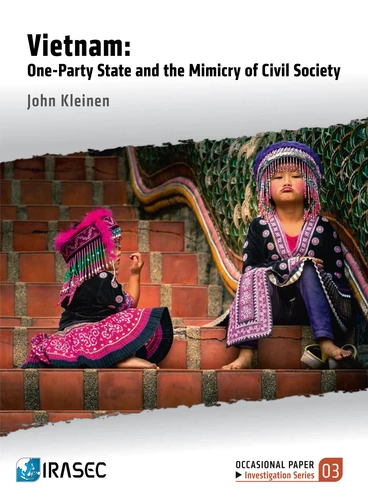Vietnam: One-Party State and the Mimicry of the Civil Society
Par :Formats :
Disponible dans votre compte client Decitre ou Furet du Nord dès validation de votre commande. Le format Multi-format est :
- Pour les liseuses autres que Vivlio, vous devez utiliser le logiciel Adobe Digital Edition. Non compatible avec la lecture sur les liseuses Kindle, Remarkable et Sony
 , qui est-ce ?
, qui est-ce ?Notre partenaire de plateforme de lecture numérique où vous retrouverez l'ensemble de vos ebooks gratuitement
Pour en savoir plus sur nos ebooks, consultez notre aide en ligne ici
- Nombre de pages118
- FormatMulti-format
- ISBN978-2-35596-016-1
- EAN9782355960161
- Date de parution15/08/2018
- Protection num.NC
- Infos supplémentairesMulti-format incluant PDF avec W...
- ÉditeurInstitut de recherche sur l’As
Résumé
Are the issues of civil society, "good governance", and the role of NGOs in Vietnam part of a discursive discourse that is linked to a growing development industry in which development studies and economics dominate? Kleinen questions these issues based upon longitudinal research in Vietnam since the early 1990s. In this study, an effort is made to explain the concrete interactions between authorities of the Vietnamese one-party state and its citizens by introducing an attitude of participants to conceal their real intentions with the intent to disguise their actions in order to obtain benefits for their own.
Using the concept of mimicry the author tries to grasp what it means to live in a society where political and economic life is dominated by elite groups and were social change is coming from different directions. Two case studies are presented here: one in which local stakeholders of home stay tourism achieve their goals to develop an acceptable form of co-habitation with ethnic minorities without questioning the state.
Another case study focuses upon the rapid urbanization of the periphery of Hanoi where land grabbing and private economic gains of outsiders are at loggerheads with local experiences and perceptions of state-village relationships. The question remains what it means for Vietnam's modernization and the prospects of a civil society.
Using the concept of mimicry the author tries to grasp what it means to live in a society where political and economic life is dominated by elite groups and were social change is coming from different directions. Two case studies are presented here: one in which local stakeholders of home stay tourism achieve their goals to develop an acceptable form of co-habitation with ethnic minorities without questioning the state.
Another case study focuses upon the rapid urbanization of the periphery of Hanoi where land grabbing and private economic gains of outsiders are at loggerheads with local experiences and perceptions of state-village relationships. The question remains what it means for Vietnam's modernization and the prospects of a civil society.
Are the issues of civil society, "good governance", and the role of NGOs in Vietnam part of a discursive discourse that is linked to a growing development industry in which development studies and economics dominate? Kleinen questions these issues based upon longitudinal research in Vietnam since the early 1990s. In this study, an effort is made to explain the concrete interactions between authorities of the Vietnamese one-party state and its citizens by introducing an attitude of participants to conceal their real intentions with the intent to disguise their actions in order to obtain benefits for their own.
Using the concept of mimicry the author tries to grasp what it means to live in a society where political and economic life is dominated by elite groups and were social change is coming from different directions. Two case studies are presented here: one in which local stakeholders of home stay tourism achieve their goals to develop an acceptable form of co-habitation with ethnic minorities without questioning the state.
Another case study focuses upon the rapid urbanization of the periphery of Hanoi where land grabbing and private economic gains of outsiders are at loggerheads with local experiences and perceptions of state-village relationships. The question remains what it means for Vietnam's modernization and the prospects of a civil society.
Using the concept of mimicry the author tries to grasp what it means to live in a society where political and economic life is dominated by elite groups and were social change is coming from different directions. Two case studies are presented here: one in which local stakeholders of home stay tourism achieve their goals to develop an acceptable form of co-habitation with ethnic minorities without questioning the state.
Another case study focuses upon the rapid urbanization of the periphery of Hanoi where land grabbing and private economic gains of outsiders are at loggerheads with local experiences and perceptions of state-village relationships. The question remains what it means for Vietnam's modernization and the prospects of a civil society.



